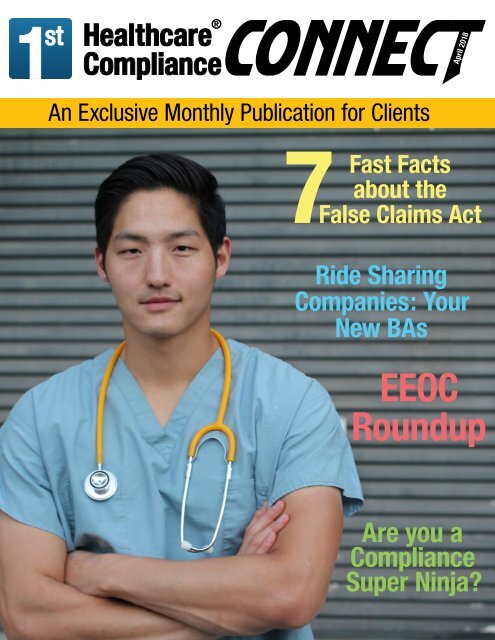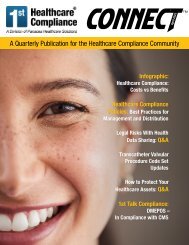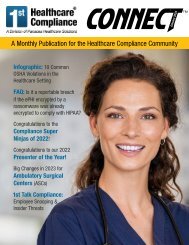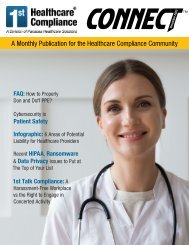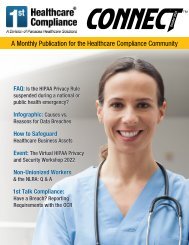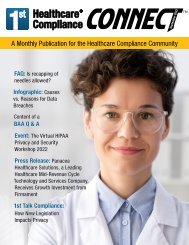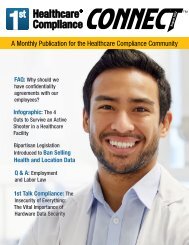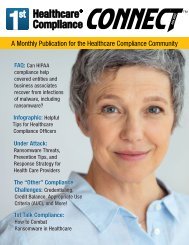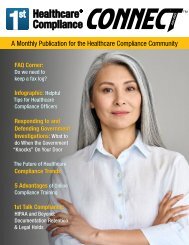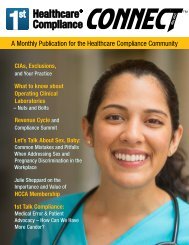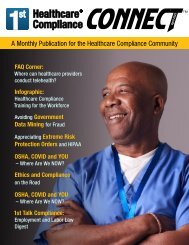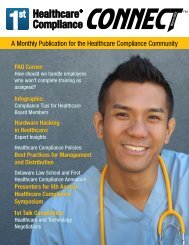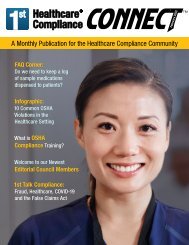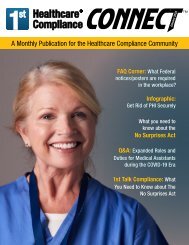First Healthcare Compliance CONNECT- April 2018
Create successful ePaper yourself
Turn your PDF publications into a flip-book with our unique Google optimized e-Paper software.
®<br />
<strong>CONNECT</strong><br />
An Exclusive Monthly Publication for Clients<br />
7<br />
Fast Facts<br />
about the<br />
False Claims Act<br />
<strong>April</strong> <strong>2018</strong><br />
Ride Sharing<br />
Companies: Your<br />
New BAs<br />
EEOC<br />
Roundup<br />
Are you a<br />
<strong>Compliance</strong><br />
Super Ninja?
Important <strong>Compliance</strong> Dates<br />
February <strong>April</strong><br />
1<br />
<strong>April</strong> 1, <strong>2018</strong> begins the transition period for claim submissions with<br />
new Medicare Cards. Cards will be mailed to beneficiaries <strong>April</strong><br />
<strong>2018</strong>-2019.<br />
<strong>April</strong><br />
30<br />
February July<br />
1<br />
Section 1904.32(b)(6) requires the OSHA Form 300A (Annual<br />
Summary) be posted no later than February 1 of the year following<br />
the year covered by the records and keep the posting in place until<br />
<strong>April</strong> 30, <strong>2018</strong>.<br />
The date by which certain employers are required to submit to OSHA<br />
the information from their completed 2017 Form 300A is July 1,<br />
<strong>2018</strong>.<br />
October<br />
1<br />
The Model Performance Period for BPCI Advanced starts on October<br />
1, <strong>2018</strong>, and runs through December 31, 2023.<br />
Each month we highlight one exceptional compliance<br />
professional chosen by our client services team. If our team<br />
notices your compliance chops, you might be the next Ninja!<br />
In This Issue:<br />
Important <strong>Compliance</strong> Dates<br />
<strong>Compliance</strong> Super Ninja<br />
7 Fast Facts about the False Claims Act<br />
Patient Safety Gaps<br />
2<br />
<strong>First</strong> <strong>Healthcare</strong> <strong>Compliance</strong>, LLC © <strong>2018</strong>
<strong>Compliance</strong> Super Ninja<br />
Nina Backes<br />
Practice Manager<br />
Nanticoke Surgical Associates<br />
How would you describe your experience with <strong>First</strong> <strong>Healthcare</strong> <strong>Compliance</strong>?<br />
My experience with <strong>First</strong> <strong>Healthcare</strong> <strong>Compliance</strong> has been so great. We started with your organization I believe<br />
4 or 5 years ago when I was trying to navigate through the red tape of compliance and HIPAA. Your organization<br />
with the dashboard set up was user friendly and saves me a tremendous amount of time and energy to keep all<br />
my compliance issues up to date. I love the fact that I receive weekly emails giving me important information<br />
to make sure all my compliance issues are up to date and accurate without me having to do all the research to<br />
navigate through the processes. I love the training modules and my staff and I do them and keep them up to date<br />
and they are so helpful. I love the fact that you automatically check all employees each month to see if there are<br />
any violations. I would have been hours upon hours trying to figure all the ins and outs of compliance without<br />
your company doing all that for me and me just checking the boxes and doing what was necessary to make sure<br />
our office stays compliant in all areas. It has been so helpful to me as a practice manager and has given me one<br />
less thing to stress over because I know if my dashboard says I am okay, then I am okay and that is such peace<br />
of mind for me.<br />
What do you enjoy most about working with Nanticoke Surgical Associates?<br />
I have been with Nanticoke Surgical Associates for over 15 years and practice manager<br />
for over 3 of those years. I truly love working here. The doctors are wonderful<br />
to work for, my staff is amazing and we all get along and work as a team each and<br />
every day. The office is beautiful and I feel fully supported by the doctors with any<br />
issues that come up with resources that they are more than willing to supply to me<br />
to make running the office as stress free as possible. I am blessed to work here.<br />
Would you rather be able to teleport anywhere or be able to read minds?<br />
I would rather be able to be telported anywhere because I have done very little traveling<br />
in my 57 years of life and there are many places I would like to visit. I would<br />
not want to read people’s minds for sure!<br />
EEOC Roundup: Cases Against <strong>Healthcare</strong> Providers<br />
1st Talk <strong>Compliance</strong><br />
Ride Sharing Companies are your New HIPAA Business Associates<br />
Upcoming Learning Opportunities<br />
Contact Toll Free: 888-54-FIRST 3
4<br />
<strong>First</strong> <strong>Healthcare</strong> <strong>Compliance</strong>, LLC © <strong>2018</strong>
Get the eBook!<br />
When a patient safety incident, medical error or adverse event occurs, patients are<br />
rarely the only victims. Join us to explore the impact on caregivers and understand<br />
the lasting damage to those providers.<br />
®<br />
Patient Safety Gaps<br />
Medical Errors and Second Victims<br />
Read more about:<br />
• Background of Patient Safety Gaps<br />
• Scope of the Problem<br />
• Medical Errors and Accountability<br />
By David M. Sommers MD JD LLM<br />
Download your copy today!<br />
Contact Toll Free: 888-54-FIRST 5
By Sheba Vine, JD, CPCO<br />
The Equal Employment Opportunity Commission (EEOC) has been<br />
scrutinizing the policies of healthcare providers recently. As the federal<br />
agency responsible for enforcing federal employment discrimination<br />
laws, healthcare providers with outdated policies and/or practices may<br />
find themselves in hot water. Here are the some of the most recent<br />
cases the EEOC has initiated:<br />
EEOC v. Montrose Memorial Hospital, Inc.<br />
EEOC sued Montrose Memorial Hospital for age discrimination because<br />
29 employees over the age of 40 were terminated for supposed performance<br />
deficiencies while younger employees were treated more<br />
leniently. The EEOC alleged that hospital management made ageist<br />
comments, including that younger nurses could “dance around the<br />
older nurses” and that they preferred younger and “fresher” nurses.<br />
Under the Age Discrimination in Employment Act (ADEA) it is unlawful<br />
to discriminate against an employee or applicant because of his/her<br />
age with respect to any term or of employment.<br />
Montrose agreed to settle the suit for $400,000 and also agreed to<br />
take the following actions:<br />
• Conduct annual anti-discrimination training for its employees,<br />
managers, supervisors and human resources employees;<br />
• Revise and distribute its anti-discrimination policy; and<br />
• Report complaints of age discrimination to the EEOC.<br />
EEOC v. Memorial <strong>Healthcare</strong><br />
The EEOC filed suit against Memorial <strong>Healthcare</strong> for religious discrimination<br />
because it withdrew a job offer as a medical transcriptionist due<br />
to Plaintiff’s religious objection to receiving an influenza vaccination.<br />
While Memorial has a policy requiring all new employees to obtain an<br />
influenza vaccination, it also has a policy that allows the use of masks<br />
for those who do not get vaccinated. The EEOC noted that Plaintiff<br />
would eventually work from home and offered to wear a mask.<br />
The EEOC claimed that Memorial’s adverse action violated Title VII<br />
of the Civil Rights Act (Title VII) which protects employees against<br />
discrimination based on religion and requires employers to provide<br />
employees with reasonable accommodations to allow them to practice<br />
their sincerely held religious beliefs. The suit is currently being litigated<br />
in the U.S. District Court for the Eastern District of Michigan.<br />
6<br />
<strong>First</strong> <strong>Healthcare</strong> <strong>Compliance</strong>, LLC © <strong>2018</strong>
Join us on Social Media!<br />
EEOC v. Mission Hospital, Inc.<br />
In another lawsuit regarding influenza policies, the EEOC<br />
filed suit against Mission Hospital for religious discrimination.<br />
EEOC stated that Mission requires all employees to<br />
receive an annual influenza vaccination. Mission allows<br />
exemptions based on religious beliefs but requires that<br />
requests be made by a specific date- Sept. 1. The EEOC<br />
alleged that three employees requested religious exemptions<br />
to the vaccination requirement and were denied<br />
because it was after the Sept. 1 deadline. As a Result,<br />
Mission terminated all three employees.<br />
Mission Health System agreed to settle the case in the<br />
amount of $89,000, in addition to the following:<br />
• Revise its immunization policy to allow employees<br />
to request an exemption during the same period in<br />
which flu vaccines are to be received;<br />
• Provide annual training for management on Title VII,<br />
including the topic of religious accommodations and<br />
employer obligations;<br />
• Post a notice about the lawsuit to all employees; and<br />
• Provide the EEOC with periodic reports on requests<br />
for religious exemption from the flu vaccination.<br />
EEOC v. Trinity Hospital<br />
The EEOC sued Trinity Hospital for violating Title VII<br />
and the Americans with Disabilities Act (ADA) because<br />
it failed to accommodate a nurse with a pregnancy-related<br />
health condition by refusing to provide her with a<br />
light-duty work assignment. The EEOC alleged that Trinity<br />
provided light-duty assignments exclusively to employees<br />
that suffered workplace injuries.<br />
The EEOC has taken the position that under the Pregnancy<br />
Discrimination Act of Title VII temporary light duty assignments<br />
must be offered to pregnant employees if the same<br />
accommodation is provided to non-pregnant employees.<br />
Trinity agreed to a $95,000 settlement in addition to the<br />
following:<br />
• Revise its policies to assure compliance with Title VII<br />
and the ADA in requiring accommodations for pregnancy-related<br />
limitations;<br />
• Provide training to its human resources employees<br />
and ensure its policies are accessible to its employees;<br />
and<br />
• Provide the EEOC with periodic reports.<br />
EEOC v. Pioneer Health Services, Inc.<br />
The EEOC sued Pioneer Health Services for failing to provide<br />
a reasonable accommodation under the ADA when<br />
it terminated a social worker/therapist for exhausting her<br />
leave under the Family and Medical Leave Act (FMLA).<br />
Plaintiff was approved for FMLA leave to undergo liver<br />
transplant surgery. Plaintiff’s request for an extension<br />
of leave for recovery was denied because she had<br />
exhausted her 12 weeks of leave. As a result, she was<br />
terminated. Pioneer also refused to re-hire Plaintiff for an<br />
available social worker/therapist position several months<br />
later.<br />
EEOC claimed that Pioneer failed to accommodate<br />
Plaintiff’s disability by denying her extension of leave<br />
request and also retaliated against her when it refused<br />
to rehire her for an open position.<br />
EEOC District director stated that “the intersection of the<br />
ADA and Family and Medical Leave Act will continue to<br />
be an area of focus for the EEOC,” Courts have ruled that<br />
disabled employees that exhaust FMLA may be entitled<br />
to additional leave as a reasonable accommodation under<br />
the ADA.<br />
Pioneer settled the case for $85,000 and agreed to the<br />
following:<br />
• Provide employee training on the ADA;<br />
• Review and update its anti-discrimination policies;<br />
• Assign a senior company official, trained on ADA,<br />
with the responsibility of providing written recommendations<br />
to Pioneer’s management before<br />
terminating any employee based on his or her actual,<br />
perceived, or record of a physical or mental impairment,<br />
or for exhaustion of medical leave.<br />
Learn from these healthcare employers mistakes to avoid<br />
similar outcomes. Make sure your policies and practices<br />
are compliant with the law.<br />
Contact Toll Free: 888-54-FIRST 7
talk<br />
compliance<br />
hosted by Catherine Short<br />
Catherine Short talks with Jennifer Gimler Brady, Partner and General Counsel at the law firm of<br />
Potter Anderson & Corroon in Wilmington, DE about Employee Handbooks: Basics and Must-<br />
Haves- discussing why employers of all sizes should utilize employee handbooks. They will<br />
also talk about some key employment laws that should be addressed in handbook policies, and<br />
some “best practice” recommendations.<br />
Starting Monday,<br />
<strong>April</strong> 23rd on<br />
Listen weekdays at<br />
7:30am, 3:30 pm, 11:30pm ET<br />
Check out our Show Page!<br />
Looking for the latest compliance insights?<br />
Subscribe to our feed and don’t miss a thing!<br />
8<br />
<strong>First</strong> <strong>Healthcare</strong> <strong>Compliance</strong>, LLC © <strong>2018</strong>
COMPLIANCE WORD SEARCH<br />
Contact Toll Free: 888-54-FIRST 9
By Sheba Vine, JD, CPCO<br />
Early this month Uber introduced the launch of Uber Health, a new service that<br />
allows healthcare organizations to provide transportation for their patients.<br />
Within days, Lyft and Allscripts announced a partnership to allow healthcare<br />
providers to schedule patient rides using Allscript’s electronic health record<br />
network. The move into Non-Emergency Medical Transportation (NEMT)<br />
services is an effort to eliminate transportation barriers for patients—a<br />
2005 study estimated that at least 3.6 million people miss or delay their<br />
medical appointments each year because they lack transportation. As ridesharing<br />
companies hail into the healthcare industry, compliance with Health<br />
Insurance Portability and Accountability Act (HIPAA) and fraud waste and<br />
abuse laws are essential for participating healthcare providers.<br />
According to HIPAA, any entity that uses or discloses protected health information<br />
(PHI) on behalf of a covered entity is defined as a Business Associate.<br />
A covered entity must obtain satisfactory assurances from a Business<br />
Associate that it will safeguard the PHI it receives or creates, also known as a<br />
Business Associate Agreement (BAA). For more information read our previous<br />
blog titled Define Your Relationship- Vendor or Business Associate.<br />
If healthcare providers are directly providing PHI to ridesharing companies to<br />
schedule transportation for patients, such as providing the patient name and<br />
home address for pick up or drop off, then a business associate relationship<br />
exists pursuant to HIPAA. As a result, healthcare providers must enter into<br />
BAAs before these services are used for their patients.<br />
<strong>Healthcare</strong> providers must also comply with fraud waste and abuse laws. For<br />
instance, the Anti-Kickback Statute (AKS) prohibits the knowing and willful<br />
payment of remuneration to induce or reward patient referrals or the generation<br />
of business involving any item or service payable by the Federal health<br />
care programs. Providing transportation at little or no cost can potentially<br />
be viewed as an inducement or kickback to use the provider. And violations<br />
under AKS can give rise to civil monetary penalties, false claims act liability,<br />
and program exclusions.<br />
Effective as of January 6, 2017, the Office of Inspector General issued a final<br />
rule that added, among other things, a local transportation safe harbor to the<br />
AKS. Specifically, the safe harbor allows healthcare providers to provide free<br />
or discounted local transportation services for Federal health care program<br />
beneficiaries, if the following are met:<br />
1. The availability of the transportation services is set forth in written policy,<br />
which is applied uniformly and consistently, and the availability of the<br />
services is not determined in a manner related to the volume or value of<br />
Federal health care program business;<br />
2. The free or discounted local transportation services are not air, luxury, or<br />
ambulance-level transportation;<br />
3. The transportation services are not publicly marketed or advertised, no<br />
marketing of health care items and services occurs during the course of<br />
the transportation or at any time by drivers who provide the transportation,<br />
and drivers or others arranging for the transportation are not paid<br />
on a per-beneficiary-transported basis;<br />
4. The services are only available to an established patient, which is defined<br />
as a patient who has previously attended an appointment and includes<br />
a patient who has scheduled an appointment.<br />
5. The patient is within 25 miles of the health care provider to or from<br />
which the individual is being transported, or within 50 miles if the patient<br />
resides in a rural area;<br />
6. Transportation services is provided for the purpose of obtaining medically<br />
necessary items and services; and<br />
7. The eligible entity that makes the transportation available bears the<br />
costs of the free or discounted local transportation services and does<br />
not shift the burden of these costs onto any Federal health care program,<br />
other payers, or individuals.<br />
42 C.F.R. § 1001.952(bb).<br />
When it comes to compliance, healthcare providers need to stay vigilante as<br />
new players enter the market.<br />
10<br />
<strong>First</strong> <strong>Healthcare</strong> <strong>Compliance</strong>, LLC © <strong>2018</strong>
The most comprehensive healthcare<br />
compliance course yet!<br />
The Fundamentals is a user-friendly, four-module course designed<br />
to help healthcare professionals understand the<br />
essential principles and practices of compliance.<br />
Written by our “dream team” of<br />
healthcare providers and attorneys,<br />
The Fundamentals Course is packed<br />
with useful, easy-to-understand<br />
information that covers HIPAA, OSHA,<br />
employment law and enforcement of<br />
Federal healthcare laws. The course<br />
takes less than four hours to complete.<br />
The <strong>Compliance</strong> Certification Board<br />
(CCB)® has approved this event for up<br />
to 4.4 non-live CCB CEUs.<br />
Visit 1sthcc.com/shop and<br />
invest in yourself today!<br />
Contact Toll Free: 888-54-FIRST 11
Join Us for These Upcoming<br />
Webinars!<br />
<strong>April</strong> 24th @ 12pm ET<br />
Keys to Optimizing Your<br />
Revenue Cycle<br />
Pam Joslin, CMC, CMIS, CMOM,<br />
CMCO, CEMA<br />
PMI<br />
May 8th @ 12pm ET<br />
Ergonomics for Medical and Dental<br />
Professionals<br />
Kelly D. Ogle, BS, MS, CMPM, CHOP®<br />
DoctorsManagement<br />
FAQs<br />
How often should a chart audit be<br />
conducted?<br />
The OIG recommends audits to be conducted periodically, but besides<br />
this there are no specific requirements outlined by OIG or HIPAA. It is<br />
up to each organization to develop an audit plan in order to identify<br />
frequency of audit and what will be covered. This will vary from<br />
organization to organization based on risk level, infrastructure, etc. We<br />
offer a audit guidebook under Audit Zone, Resources, which provides<br />
pertinent information on conducting audits of medical records.<br />
Contact our Client Services Team with your questions!<br />
888.54.FIRST or clientservices@1sthcc.com<br />
12<br />
<strong>First</strong> <strong>Healthcare</strong> <strong>Compliance</strong>, LLC © <strong>2018</strong>


